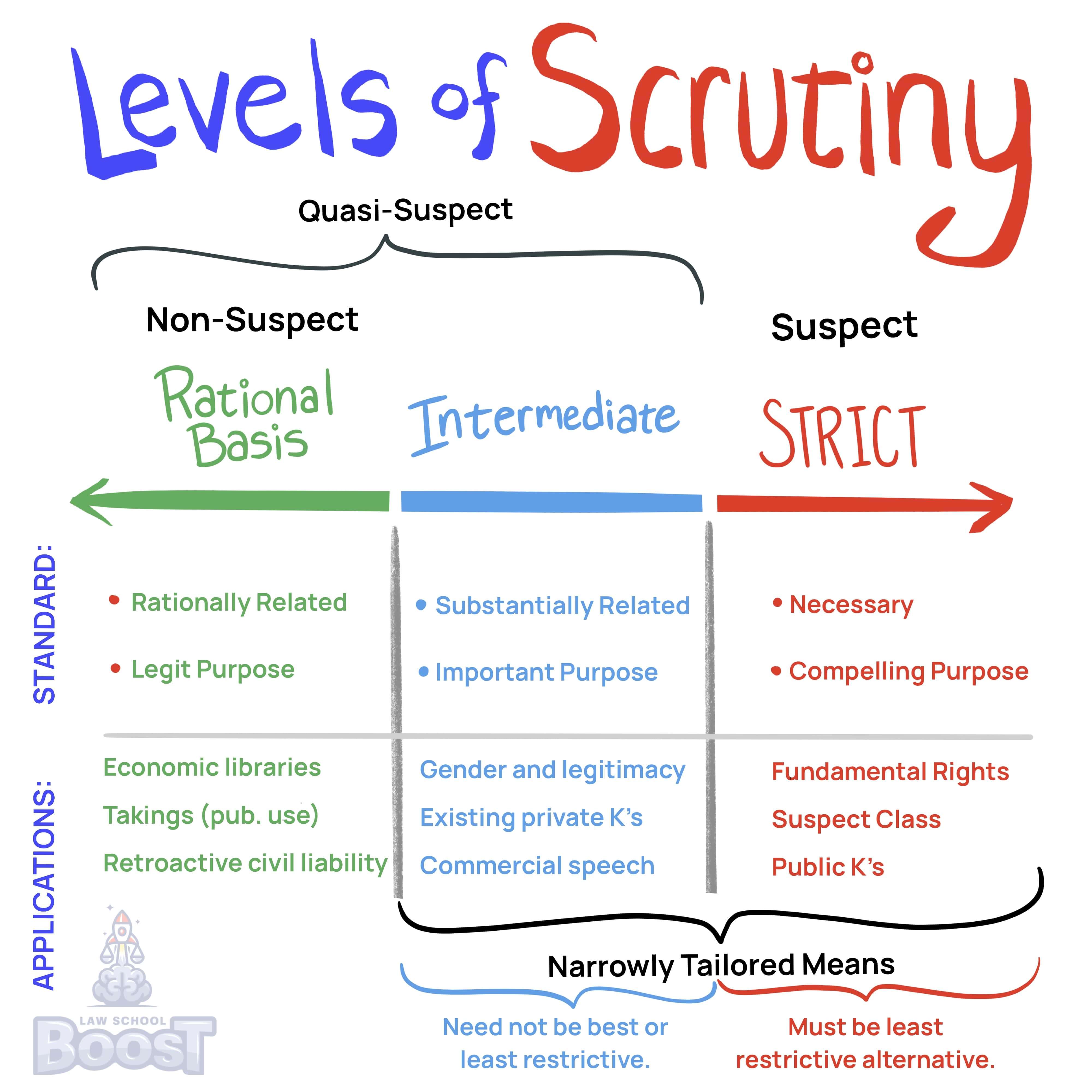🇺🇸
Constitutional Law • Levels of Scrutiny
CONLAW#060
Legal Definition
Government action is upheld if it is substantially related to an important government purpose. The burden is on the government, and the court will look only to the government's actual purpose. The means used must be very good but not the best or least restrictive possible. The court often uses narrowly tailored language here (as it does in strict scrutiny).
Plain English Explanation
When certain rights are affected, like gender equality and commercial speech, courts apply intermediate scrutiny. This is between the extremely lenient rational basis test and the rigorous strict scrutiny test.
Here the government must show the law serves an important government interest, not just a legitimate interest. And the means must be substantially related to that interest, not just rationally related. Speculation alone is not enough - the fit needs to be quite strong.
Courts will look only at the actual purpose behind the law, not any conceivable rationale. The government has the burden of proof, unlike with rational basis.
The law also must be narrowly tailored, but not necessarily the least restrictive means possible. So the fit does not need to be perfect, but still reasonably close. Some over- or under-inclusiveness is allowed.
Here the government must show the law serves an important government interest, not just a legitimate interest. And the means must be substantially related to that interest, not just rationally related. Speculation alone is not enough - the fit needs to be quite strong.
Courts will look only at the actual purpose behind the law, not any conceivable rationale. The government has the burden of proof, unlike with rational basis.
The law also must be narrowly tailored, but not necessarily the least restrictive means possible. So the fit does not need to be perfect, but still reasonably close. Some over- or under-inclusiveness is allowed.
Hypothetical
Hypo 1: New Hypoland enacts a content-neutral law that prohibits any form of protest within 100 feet of government buildings, aiming to enhance security. Bob, planning to hold a peaceful protest against a recent government policy, challenges the law as a violation of his First Amendment rights. Result: The court applies Intermediate Scrutiny because the law is a content-neutral restriction on speech. New Hypoland must demonstrate that the law serves an important government interest (security) and that the restriction is substantially related to achieving that interest without completely prohibiting protests. The court upholds the law, finding it appropriately tailored to increase security around government buildings while still allowing for protests beyond the 100-foot perimeter.
Hypo 2: Hypofornia passes a law that requires all retailers to place warning labels on video games depicting violence against animals. Bob, a video game retailer, challenges the law, arguing it infringes on his right to sell video games and burdens the creators' rights to free expression. Result: The court uses Intermediate Scrutiny to assess the law because, while it implicates freedom of expression, the regulation is content-neutral as it only mandates labels without banning or limiting the sale. Hypofornia must show the law serves an important government interest (informing consumers about violent content) and is substantially related to that interest. The court finds the law appropriately tailored to achieve its goal without unduly infringing on free expression. The law would likely be upheld.
Hypo 3: New Hypoland requires all private businesses that serve the public to install wheelchair ramps, aiming to ensure accessibility for individuals with disabilities. Bob's historic inn, designated as a heritage site, challenges the law, claiming it infringes on his property rights and poses an undue economic burden. Result: The court applies Intermediate Scrutiny because the law involves regulation of private property to serve a public interest. New Hypoland must demonstrate the law serves an important governmental interest (accessibility for individuals with disabilities) and is substantially related to achieving that interest. The court upholds the law, finding it a very good way to promote accessibility, despite the economic burden on certain property owners.
Hypo 2: Hypofornia passes a law that requires all retailers to place warning labels on video games depicting violence against animals. Bob, a video game retailer, challenges the law, arguing it infringes on his right to sell video games and burdens the creators' rights to free expression. Result: The court uses Intermediate Scrutiny to assess the law because, while it implicates freedom of expression, the regulation is content-neutral as it only mandates labels without banning or limiting the sale. Hypofornia must show the law serves an important government interest (informing consumers about violent content) and is substantially related to that interest. The court finds the law appropriately tailored to achieve its goal without unduly infringing on free expression. The law would likely be upheld.
Hypo 3: New Hypoland requires all private businesses that serve the public to install wheelchair ramps, aiming to ensure accessibility for individuals with disabilities. Bob's historic inn, designated as a heritage site, challenges the law, claiming it infringes on his property rights and poses an undue economic burden. Result: The court applies Intermediate Scrutiny because the law involves regulation of private property to serve a public interest. New Hypoland must demonstrate the law serves an important governmental interest (accessibility for individuals with disabilities) and is substantially related to achieving that interest. The court upholds the law, finding it a very good way to promote accessibility, despite the economic burden on certain property owners.
Visual Aids



